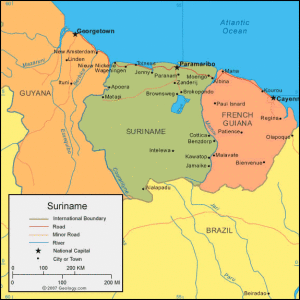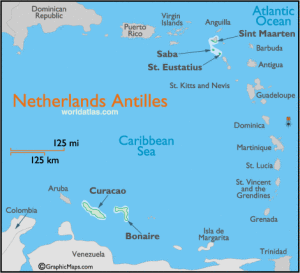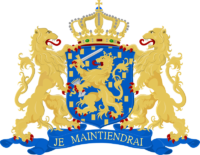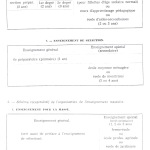Wikipedia ~ Suriname
Suriname (/ˈsʊrɨnæm/, /ˈsʊrɨnɑːm/ or /ˈsʊrɨnəm/, also spelled Surinam), officially known as the Republic of Suriname (Dutch: Republiek Suriname, Dutch pronunciation: [ˌreːpyˈblik ˌsyːriˈnaːmə]), is a country on the northeastern Atlantic coast of South America. It is bordered by French Guiana to the east, Guyana to the west and Brazil to the south.
Suriname was colonized by the English and the Dutch in the 17th century. In 1667 it was captured by the Dutch, who governed Suriname as Dutch Guiana until 1954. At that time it was designated as one of the constituent countries of the Kingdom of the Netherlands, next to the Netherlands and the Netherlands Antilles (dissolved in 2010). On 25 November 1975, the country of Suriname left the Kingdom of the Netherlands to become independent. A member of CARICOM, it is considered to be a culturally Caribbean country and has extensive trade and cultural exchange with the Caribbean nations.
At just under 165,000 km2 (64,000 sq mi), Suriname is the smallest sovereign state in South America. (French Guiana, while less extensive and populous, is an overseas department of France.) Suriname has a population of approximately 566,000, most of whom live on the country’s north coast, where the capital Paramaribo is located. Suriname is a mostly Dutch-speaking country; Sranang, an English-based creole language, is a widely used lingua franca. It is the only independent entity in the Americas where Dutch is spoken by a majority of the population.
Read more: http://en.wikipedia.org/wiki/Suriname
Wikipedia ~ Netherlands Antilles
The Netherlands Antilles (Dutch: Nederlandse Antillen [ˈneːdərˌlɑntsə ɑnˈtɪlə(n)] , Papiamentu: Antia Hulandes), also referred to informally as the Dutch Antilles, was an autonomous Caribbean country within the Kingdom of the Netherlands. Although the country has now been dissolved, all of its constituent islands remain part of the kingdom under a different legal status and the term is still used to refer to these Dutch Caribbean islands.
The Netherlands Antilles consisted of two distinct island groups. First, the “windward” or “ABC Islands” — Aruba, Bonaire, and Curaçao — are located in the southern Caribbean Sea, just off the Venezuelan coast. Second, the “leeward” or “SSS islands” — Sint Maarten, Saba, and Sint Eustatius — are part of the Lesser Antilles; they are approximately 800–900 kilometers (500–560 miles) northeast of the ABC Islands. The Dutch colonized the various islands in the 17th century and united them as the Netherlands Antilles in 1954.
The Netherlands Antilles was dissolved on 10 October 2010. Curaçao and Sint Maarten became distinct constituent countries alongside Aruba which had become a distinct constituent country in 1986; whereas Bonaire, Sint Eustatius, and Saba (the “BES Islands”) became special municipalities within the Netherlands proper.
Read more: http://en.wikipedia.org/wiki/Netherlands_Antilles





